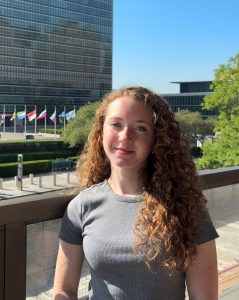Internship Blog Series – International Rescue Committee
My name is Charlotte Sens, and I am a Diplomacy and International Relations major with minors in Asian Area Studies and Data Visualization. This summer I am interning with the International Rescue Committee in their Workforce Development taskforce, finding work opportunities for refugees mainly coming from Haiti and the Middle East (Palestine and Syria). I mainly craft resumes and apply to jobs for our clients, while also completing intake meetings and doing data entry. I am communicating with many different people in different languages throughout the day, which occasionally presents challenges to clear communication. To expand on this, some of our clients will move out of state and fail to tell our organization, distancing themselves from the services we provide. Other times, I will organize a meeting with a client, but my translation will be slightly incorrect and the conversation will become redundant and frustrating as we both fail to understand each other. However, through this frustration, I have learned to be patient and how to productively address client frustrations while moving forward with our own goal to find them a job.
Refugeeism and migration are significant public concerns within the international community and domestically. This internship has brought to light systematic disadvantages that refugees face in coming to the United States. While I had previously learned of the refuge process in a previous class (ETW: Refugees, Religion, and Politics and International Relations of Southeast Asia), it is very different seeing it in practice. Many of our clients do not speak English or do not have substantial employment history or education or access to a car. As I try to find jobs to accommodate them, I find that many simple, entry-level jobs have unfair requirements far outside the qualifications of my clients. I find that my coursework with the school of diplomacy has helped remedy this, as I have been able to utilize writing and research skills to find businesses that will accommodate my clients, and the resources provided by the school of diplomacy has allowed me to cultivate professional skills so that I can confidently conduct myself both when I’m in the office and when dealing with clients and employers.
The professional skills I have learned throughout this experience, including professional communication and conduct as well as data entry and reporting skills, have made me more confident to enter the work force post-grad. I have also become more familiar with the operations of the migration and refugee system within the United States, and I can bring this knowledge to future experiences. I would highly recommend this internship to other students as it is highly rewarding work, and every task serves to aid refugees and improve their livelihoods. While it may be frustrating or demoralizing at times, it is a very positive experience to be able to help those in need.



